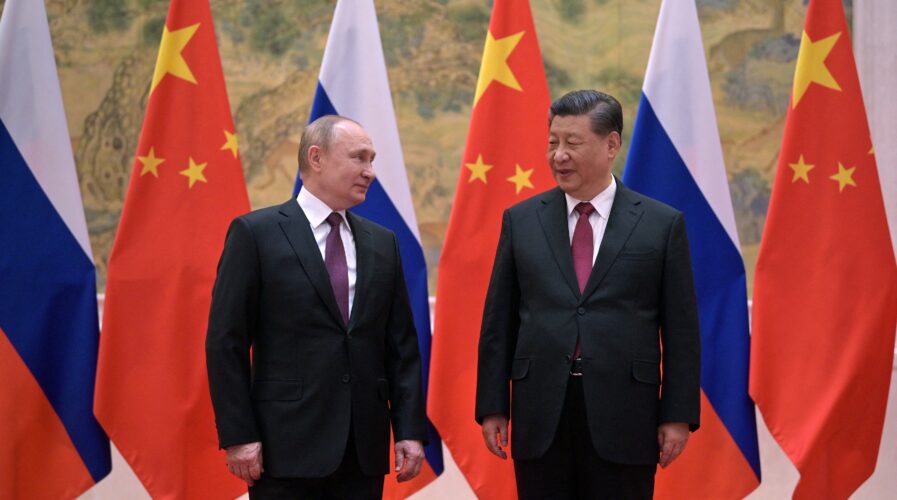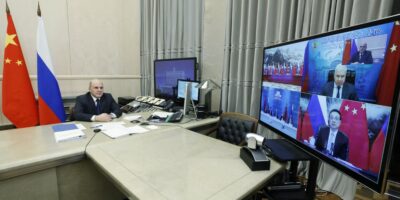
Is Ukraine’s invasion forging closer ties between Russia and China? (Photo by Alexei Druzhinin / Sputnik / AFP)
Is Ukraine’s invasion forging closer ties between Russia and China?
- With Western companies halting operations in Russia to an extent, their Chinese rivals have an opportunity to capitalize on their departure.
- Most Chinese companies take their cue from Beijing, which has declared its opposition to US sanctions.
On February 4 this year, just before Russian’s invasion of Ukraine, President Vladimir Putin and Chinese leader Xi Jinping met and advertised their ambitions to build what they call a fairer, more stable global order — one in which the United States (US) is a lesser presence. Publicly, the leaders of China and Russia vowed that their countries’ friendship had “no limits.”
About 20 days later, Russia invaded Ukraine and what came after was a series of economic sanctions and severed diplomatic ties — to which Putin seems unperturbed. In the same meeting between the Russian and Chinese leaders, the latter also declared that there would be “no wavering” in their partnership.
In a February 4 joint statement, the US was mentioned six times in total and in contrast, there was no mention of Ukraine. Nonetheless, experts reckon Xi’s endorsement of Putin’s opposition to NATO expansion in the statement focused the attention of many in the West on China’s role in the developing Ukraine crisis.
Then, Russian troops marched into Ukraine on February 24 and ever since that, China has been walking what many foreign-policy experts call a diplomatic tightrope. A week before, amidst the looming threat of a Russian invasion of Ukraine, China embarked on a series of statements that showed a desire to dial back or clarify Beijing’s embrace of the Kremlin.
To put it simply, China is locked into having to help Russia and has little interest in seeing Moscow collapse economically. All while it is trying to stick to its foreign-policy principles around sovereignty and attempting to prevent its relations with the US and Europe from completely collapsing.
On the other side, the US, UK and EU did not slow down when it came to imposing sanctions — all while indicating that there could be more to come. The initial sanctions included targeting Russian banks, high-level individuals and sovereign debt. However, it is not something that Russia did not foresaw happening.
Russia hurled into Ukraine well planned. The country, prior to that, has taken steps to buffer itself against the economic blow that sanctions could impose. Moscow has been working to bolster its finances, which could help cushion the economy and keep the government funded in the event of sanctions.
Putin’s administration trimmed its budget, beefed up foreign exchange reserves and diversified its trade portfolio to become less dependent on the EU for export revenues. In fact, Moscow’s effort could be trailed back to 2014, in the years since the U.S. and other countries imposed sanctions on Russia over its annexation of Crimea.
Since then, Moscow has had time to retool its economy in an attempt to make it more resistant to far-reaching punitive measures. “Putin has been preparing for this moment since 2014,” BlueBay Asset Management senior emerging-market sovereign strategist Timothy Ash, wrote in a note last week.
China vs the West: The stance on Russia
Officially, China has taken a pretty neutral stance on the Russian invasion and has not exactly condemned the assault. But the country has also been careful not to endorse Russia’s military invasion of Ukraine.
On the other hand, countries like the US, European Union, UK, Japan, Canada and Australia have unveiled a raft of punitive measures against Moscow, which include expelling some Russian banks from the SWIFT international payments system, blocking Russia’s central bank from using its foreign reserves to support the value of its currency, and banning broadcasts of Russian state media.
Moscow also wasn’t able to sanction-proof its technology mainly because the global chip industry is largely dominated by companies from the US and its allies in Europe, Taiwan and South Korea. Export restrictions on tech would literally limit Russia’s ability to buy machine tools, smartphones and other consumer electronics.
However, as mentioned earlier, Russia came prepared. Take Visa and Mastercard’s suspension of service in Russia for instance. Russian banks immediately thought of an alternative–to issue cards using China’s UnionPay system.
Russian Visa and Mastercard bank cards, since Sunday, will no longer be valid abroad, and cards issued abroad will no longer work in Russia, the global payments companies announced. That was when major Russian lenders Sberbank and Alfa Bank said they are working on a rollout of UnionPay cards.
One can conclude that the sentiment throughout China basically reflects that of its government. When Chinese ride-hailing giant Didi Chuxing announced that it would pull out of Russia, the company faced a public backlash in China, with social media users accusing it of succumbing to US pressure on Moscow. The company later reversed the decision without giving an explanation.
Even personal computer maker Lenovo faced heavy criticism in China when a local Belarusian news outlet reported, without saying where it got the information, that the company would stop supplying Russia. When it comes to smartphones, Chinese companies controlled about 41% of the Russian smartphone market last year, according to Counterpoint Research.
They include Xiaomi and other fast-growing brands, Honor Device Co. and Realme Chongqing Mobile Telecommunications Corp. Interestingly, Xiaomi is the top smartphone brand in Ukraine, where it entered in 2016, making up 45% of shipments in the third quarter, far ahead of Samsung at 28%, according to market research firm Canalys.
The downside is that those Chinese companies would eventually be subjected to secondary sanctions against Russia via the US’ Foreign Direct Product Rule, which stipulates that products with a certain percentage of US-origin technology cannot be shipped to targeted parties without a proper license.
READ MORE
- Strategies for Democratizing GenAI
- The criticality of endpoint management in cybersecurity and operations
- Ethical AI: The renewed importance of safeguarding data and customer privacy in Generative AI applications
- How Japan balances AI-driven opportunities with cybersecurity needs
- Deploying SASE: Benchmarking your approach


